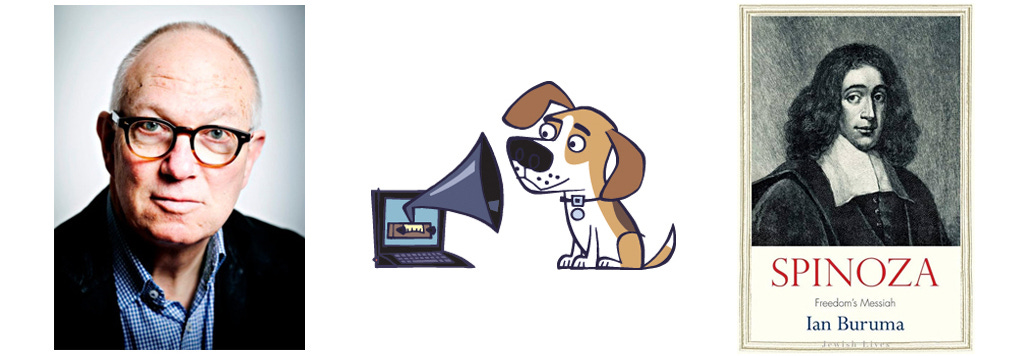Ian is a historian, a journalist, and an old friend. He’s currently the Paul Williams Professor of Human Rights and Journalism at Bard College. He served as the editor of The New York Review of Books and as foreign editor of The Spectator, where he still writes. He has written many books, including Theater of Cruelty, The Churchill Complex, and The Collaborators — which we discussed on the Dishcast in 2023. This week we’re covering his latest book, Spinoza: Freedom’s Messiah, and the example of Spinoza’s intellectual integrity in a deeply tribal and emotional time.
For two clips of our convo — on cancel culture in the 17th century, and how Western liberalism is dying today — see our YouTube page.
Other topics: Ian’s Dutch and Jewish roots; the Golden Age of Amsterdam; its central role in finance and trade; when Holland was a republic surrounded by monarchies; the Quakers; Descartes; Hobbes; how sectarianism is the greatest danger to free thought; religious zealots; Cromwell; Voltaire; Locke; the asceticism of Spinoza; his practical skill with glasswork; the religious dissents he published anonymously; his excommunication; his lack of lovers but plentiful friends; how most of his published work was posthumous; his death at 44; the French philosophers of the Enlightenment shaped by Spinoza; how he inspired Marx and Freud; why he admired Jesus; Zionism; universalism; Socrates; Strauss’ Persecution and the Art of Writing; Puritanism through today; trans activists as gnostic; Judith Butler; the right-wing populist surge in Europe; mass migration; Brexit and the Tory fuckup; Trump’s near-alliance with Russia; DOGE; the rising tribalism of today; and thinking clearly as the secret to happiness.
Browse the Dishcast archive for an episode you might enjoy (the first 102 are free in their entirety — subscribe to get everything else). Coming up: Evan Wolfson on the history of marriage equality, Nick Denton on China and AI, Francis Collins on faith and science, Michael Lewis on government service, Douglas Murray on Israel and Gaza, and Mike White of White Lotus fame. Please send any guest recs, dissents, and other comments to dish@andrewsullivan.com.
From a fan of last week’s pod:
Your discussion with Christopher Caldwell was terrific. I didn’t agree with everything he said, but what a relief to hear a measured analysis of the Trump presidency so far.
I’m no fan of Trump, but the strange collective hysteria in response to him is frustrating. Like all presidents, Trump does good things, and he does bad things. But the mere mention of his name and everyone shouts the same list of crimes, over and over. Some of these crimes are real and some imagined, but what’s missing is thoughtful analysis and smart opposition. Take a deep breath, people. As Caldwell said, we’re only six weeks into this.
Yes, but the creepy, dangerous spot-truth cultism remains. From a critic of Caldwell:
He’s an example of how every Trump supporter projects onto Trump what they want him to be and refuse to believe what he has been telling them and actually doing for the past 10 years. It’s the same for the working class as it is for a conservative intellectual like Christopher Caldwell. What they want Trump to be may be different for each supporter, but they all rationalize his behaviors to fit their wishful thinking.
And another:
Your conversation with Caldwell brought to mind the play The Fantasticks, which I assume you saw at sometime during its very long run. The devilish character, El Gallo, takes the heroine on a journey around the world and gives her a magic mask to wear, through which all looks rosy and fine. At various points the mask slips and she sees the reality before her — for example, at first seeing an auto-de-fe as a bonfire and people celebrating, but when the mask slips, she sees people being burned alive. Urged to put the mask on again, all turns rosy and fine.
Here’s another clip of the episode, on the Musk mayhem:
Another listener writes:
I just wanted to briefly call your attention to a trend that is fast becoming an established Newtonian law: that any and all attempts to present a rational, ethically-defensible theory of Trump must be followed promptly — usually within days — by a regrettable Trump incident that unequivocally disproves that theory and embarrasses the poor schmo who proposed it.
Just a few minutes into your chat with Caldwell, I couldn’t help but smile. He clearly spends a fairly large amount of his time and energy working on enlightened theories of Trump that he hopes next time might defy the Law of Trumpian Dynamics, or whatever you want to call it. The Ukrainian portion of your conversation was particularly demonstrative of the futility of this pursuit, being released on the same day that Trump and Vance arranged for a tag-team, Real Housewives-style, shout-down hazing of President Zelensky in front of the White House press corps.
You were of course correct in your assessment of Trump: he’s a bottomlessly immoral narcissist and bully whose worldview is one of a cheap gangster. This is obvious to anyone, but of course it’s awfully unflattering, and Trump needs his defenders. But in the future, just to test the sincerity of your next Trump theorist guest, I wonder if you might ask them right off the bat if they believe Trump is person of any integrity, or if they would hypothetically trust a Donald Trump with anything of personal value to them. I suspect the non-answers would be revealing.
I’d just like to ask them if they believe, as Trump does, that he is the greatest president in history, including George Washington.
One more on the episode:
I wish you had given Caldwell more time to speak, because the conversation could have gone to some really interesting places. I think he understands Trump in a way that a lot of people don’t. I am a person in their 20s who grew up in the Deep South of liberalism (the Bay Area), but who actually voted for Trump in 2024 (“you either die a hero or live long enough to see yourself become the villain”). I agnostically support what Trump is doing, and Caldwell is articulating a nuance about him and his motivations that I think is generally lacking.
Trump is a tribal president, but we are in a tribal time. A lot of chest beating happens now (on both sides), but if you understand this as a political necessity, Trump takes on a different shade. You should check out Marshall Mcluhan if you haven’t read/listened to him in awhile:
While you can hate Trump, you should try to see past his shortcomings — not because they aren’t shortcomings, but because they are shortcomings from a different time. The change driven by screens to the social-cultural environment is the same change that has caused colleges to stop being the bastions of learning and civility.
I also listened to your conversation with Carole Hooven, and something I noticed in her story, and from my personal experience in academia, is how tribal DEI and left-wing orthodoxy are. You are either in the group or out of the group. Saying people are tribal in today’s world is nothing new, but when put in the frame of McLuhan’s global village, this tribalism is seen less as a marker of America’s divisions and more the effect of a completely different technological landscape.
In the global village, the perfect face with the perfect answer (Kennedy, Reagan, Clinton, Obama) starts to stand out as not genuine, because it’s not; it’s too perfect. It’s why Kamala comes off as fake, because the nature of everyone being a publisher, and everyone having a camera in their pocket, means that there is no separation between private life and public life. She has to be extremely fake to be television ready 24/7. Trump does well on social media because he has no sense of obligation to what he says. In a crazy way, this quality is an extremely helpful tool in getting things done when everything you say is written down and retrievable.
I’m not sure he’s “getting things done,” to be honest.
Next up, a reader remarks on the Trump-Zelensky clusterfuck in the Oval Office last week:
Seeing that drama unfold on camera, to see Zelensky’s beleaguered face, the performative anger of Vance, and the sincere anger and contempt of crimson-faced Trump exhibited has left me as just about as depressed about the world as I can recall since Trump’s initial election in 2016.
But I cannot help but express: just what was Zelensky thinking? It was obvious to any observer that Trump believes what he believes about Ukraine (Ukraine is the aggressor, Zelensky is corrupt, etc.) He just believes it. Everyone also knows that rule #1 is: You. Do. Not. Contradict. Trump. You just don’t.
This confrontation was inevitable. It was basically scripted. How did the hundreds of planners and advisors allow this to happen?
Ukraine should have insisted on no press conference. No Oval Office meeting. Zelensky should not have even travelled to DC. Reduce any chance of stuff being on television, and Trump would have turned his attention to other things.
The agreement on minerals in exchange for — we still know not what — should have been signed BEFORE the public engagements. Or Zelensky should have insisted on a meeting on camera with Rubio, not Trump. Instead, we got the ugly scene we all saw because everyone still seems to think (or pretends to think) that Trump is normal and responds to a world of facts.
I get it. Ukraine wants to show they are an independent and strong country. France and the UK got their own Oval Office meetings; so should Ukraine. But why not have Macron and Starmer come WITH Zelensky to the White House? Stand united WITH him. Instead, France and the UK scurried away, basically anticipating the fireworks that would occur on Friday. Cowards.
In order for Ukraine to survive, Zelensky needs to resign. It is profoundly unfair, but Trump despises him — personally and irrevocably. Ukraine cannot hope to receive any additional support in word, dollar, or deed from the US until Zelensky departs the stage. He has already said he’s willing to go if he gets NATO membership. (We know that is a political impossibility.) So Zelensky needs to get on the phone with the EU this very instant and see what can be done. Sign over the mineral rights to the EU and to Canada. Throw Australia and Japan into the mix. Exclude the US. And then depart.
Zelensky deserves so much for his service, but he’s now an impediment to his own country’s freedom. It saddens me deeply to write this, but it’s the truth. Politics ain’t fair. As Thatcher said, “It’s a funny old world.” The comedian in Zelensky will appreciate that.
I find this pretty persuasive. But the problem with Trump is there is no guarantee he would treat any Ukrainian president differently. He despises the country, and is saturated in the online right’s demonization of the place.
Here’s a dissent over last week’s column, “The Other Resistance — From The Right”:
Without taking anything away from the integrity or quality of the conservative writers you named, I nonetheless found the result a bit disingenuous. Yes, as you say, the authors and publications you cite are speaking truth to power. Yes, there’s a resistance from the right. Yes, Hagan Scotten’s letter was a literal high point of my day when I read it.
However, positioning these achievements in a contest with the left reads as petty and snide.
Listen to this episode with a 7-day free trial
Subscribe to The Weekly Dish to listen to this post and get 7 days of free access to the full post archives.














